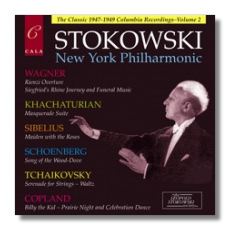
The Internet's Premier Classical Music Source
Related Links
- Latest Reviews
- More Reviews
-
By Composer
-
Collections
DVD & Blu-ray
Books
Concert Reviews
Articles/Interviews
Software
Audio
Search Amazon
Recommended Links
Site News
 CD Review
CD Review
Classic 1947-1949 Columbia Recordings, Volume 2

- Richard Wagner: Rienzi Overture
- Jean Sibelius: Maiden With the Roses (from Swanwhite)
- Aram Khachaturian: Masquerade Suite
- Piotr Ilyitch Tchaikovsky: Waltz from Serenade for Strings
- Richard Wagner: Die Götterdämmerung
- Siegfried's Rhine Journey
- Siegfried's Funeral Music
- Arnold Schoenberg: Song of the Wood Dove from Gurrelieder (arr. Erwin Stein)
- Aaron Copland: Billy the Kid
- Prairie Night
- Celebration Dance
Martha Lipton, mezzo-soprano
New York Philharmonic-Symphony Orchestra/Leopold Stokowski
Cala CACD0534
The 40s were peripatetic years for Stokowski. There were stints with his All-American Youth Orchestra, the NBC Symphony Orchestra, the New York City Symphony Orchestra, and various gigs in San Francisco and Hollywood. He continued to make recordings with all of these orchestras as well as HIS Symphony (an ad hoc group of some of the finest musicians in New York, and with the New York Philharmonic. There is little doubt that he wanted to land another permanent job but circumstances, some of his own making, worked against that. Ironically making Fantasia was one factor that was held against him, another was marrying Gloria Vanderbilt, and then there was the fact that he was demanding. He had high hopes for the New York Philharmonic position, vacated by Rodzinski and played his Ace card in the Mahler 8th. Still, it was not to be and he went on through the 50s playing gigs here and there until he sort-of settled with another orchestra of his creation, the American Symphony Orchestra.
While his recordings in the 40s with the All-American Youth Orchestra and "HIS" Orchestra were good to very good, they could not compete with those of the NBC Symphony Orchestra and particularly with the New York Symphony Philharmonic (as it was then known). Of the two, I always found the New York Philharmonic recordings superior, probably due to the recording venue.
Stokowski first performed the Rienzi Overture in Cincinnati in 1912. He recorded it four times and there was one live performance issued on a Melodram LP and there is also on a BBC live performance in England on CD. When this recording was released a reviewer in Gramophone said, "The whole thing has a displeasing, larger-than-life, transatlantic glamour." Frankly I thought Wagner's operas were supposed to be 'larger than life' and I am not sure what is wrong with being transatlantic. Yes, this is larger than life. The recorded sound, as in Volume One, is excellent.
Stokowski knew Sibelius personally. There is a photo of the two taken when Stokowski visited the composer at his home in Finland. "Girl with roses" for some reason brings to mind Valse Triste. There is a poignancy that Stokowski captures perfectly. It damn near brings tears to my eyes. The abrupt change to the next piece is almost jarring, however.
These recordings were taken from the lacquer discs transferred to tape. In the case of the Khachaturian you will notice a bit of swish that was on the lacquer masters but only in the opening of the quieter passages and not between the parts. The ear soon adjusts to this, however, and this should not dissuade you especially since the sound here, as everywhere else, is so much better than the LP. In fact, if you have the record you won't notice the sound at all because the El-Pee format obscured it completely. As for the performance, I can do no better than repeat the quote from The New Records in 1950, "As a lesson in how to take trite music and make it sound actually great, this set is not only a lesson but a whole course for aspiring conductors." [In Richard Gate's notes for the CD, notice it says, "set". I assume the writer must have been listening to the 78s.]
Then there is Wagner. Stokowski presents the majesty, the panoramic sweep, and the beauty. Every time I hear Stokowski's Wagner I am reduced to blathering about how good it is. Here Stokowski shows us just how great the orchestra had become. Yes, the Stokowski Sound is there and the music making rivals his work with the Philadelphia Orchestra.
I don't like the Schoenberg and will therefore not comment on it.
"We're not in Walhalla anymore," Dorothy said, or something like that. To skip from Siegfried to Billy the Kid is a time warp in many ways. As a kid I would sometimes sleep outdoors in the summer. I'd look up at the stars in the black skies and think about infinity. Stokowski brings back those memories. Then there is the Celebration Dance. Wow! Stokowski brings an element of the surreal to the music that I don't hear anywhere else. Neat stuff.
Okay, these discs are not just for Stokowski fans. There is some damn fine music making here from an era that no longer exists. I wish that conductors today could study Stokowski's music making. These discs are strongly recommended for any serious lover of classical music.
You can contact the Leopold Stokowski Society at:
www.stokowskisociety.net
or via email at:
ddavis4956@aol.com
Copyright © 2002, Robert Stumpf II




















